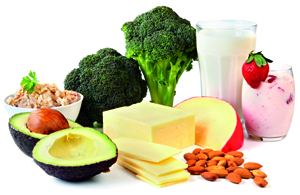Healthy eating for kids: Myth #1
6/25/2018 by Dr. Natalie Gentile, Kristine Penza, APRN, CNP, and Kayla Allen, RN

With so many competing messages about the “best” way to eat, navigating the grocery aisles can be confusing. We all have the same goal: to provide our families with healthy meals and snacks. So it’s important to be equipped with the evidence supporting a well-balanced diet when you head to the supermarket.
Starting healthy habits in childhood leads to healthy habits in adulthood. When it comes to healthy eating, the focus is “the more whole foods, the better”. This includes fruits, vegetables, whole grains and legumes like dried peas, beans and soybeans.
In this series, we’re addressing several nutrition myths to help make healthy food choices less confusing.
Myth #1: Kids need cow’s milk
We commonly hear that kids have to drink cow’s milk in order to get the calcium they need to grow strong bones. The fact is that most of us get more calcium than we need. A 2013 study in JAMA Pediatrics showed that children in countries with lower dairy milk intake had lower rates of bone fractures than those in countries with high dairy milk intake, including the U.S.
In addition, the rates of lactose intolerance are exceptionally high, especially in certain populations. For example, some estimates indicate that 90% of Asian-Americans and 70% of African-Americans are lactose intolerant. Yet, we continue to put milk at the center of meals served both at school and home.
What options do we have for dietary calcium, without the sugar, calories and other adverse effects of drinking dairy milk?
It turns out that several plant-based foods are great sources of calcium, including bok choy, collards, kale, chia seeds, almond butter, beans, broccoli and tahini. There also are several plant-based milk alternatives that are excellent sources of calcium such as soy, hemp, almond and coconut milks. And remember, calcium is not the only key to strong bones. Daily exercise is essential for building strong bones for life!
For more detailed information on nutrition recommendations, check out The Nutrition Source website from the Harvard School of Public Health and NutritionFacts.org.
If you or your child’s health care provider is concerned about your child’s weight, consider KidShape offered by ExercisAbilities, Inc., in Rochester. It’s a program delivered by a registered dietitian and youth exercise specialist for children ages six to 12 and includes six interactive sessions that focus on nutrition, family cooking, cognitive behavior modification, self-esteem, parenting support and more. For more information, visit ExercisAbilities’ website and select “KidShape” under the Nutrition Wellness tab.
If you’re covered by Medical Assistance and Minnesotacare, you’re eligible for Medical Nutrition Therapy (MNT), which provides certain services by a registered dietician or nutrition professional.
In our next article, we’ll look at the myth about how much sugar is too much.
Dr. Natalie Gentile is a provider in Employee and Community Health’s (ECH) department of Family Medicine. Her key areas of interest are nutrition, obesity and preventive and lifestyle medicine. She is also a certified Power Vinyasa yoga instructor and group fitness instructor.
Kristine Penza, APRN, CNP, is a Family Medicine nurse practitioner at Mayo Clinic Express Care. Her interests include nutrition and functional medicine.
Kayla Allen, RN, is a pediatric RN care coordinator with ECH.
